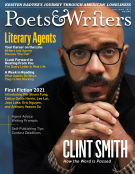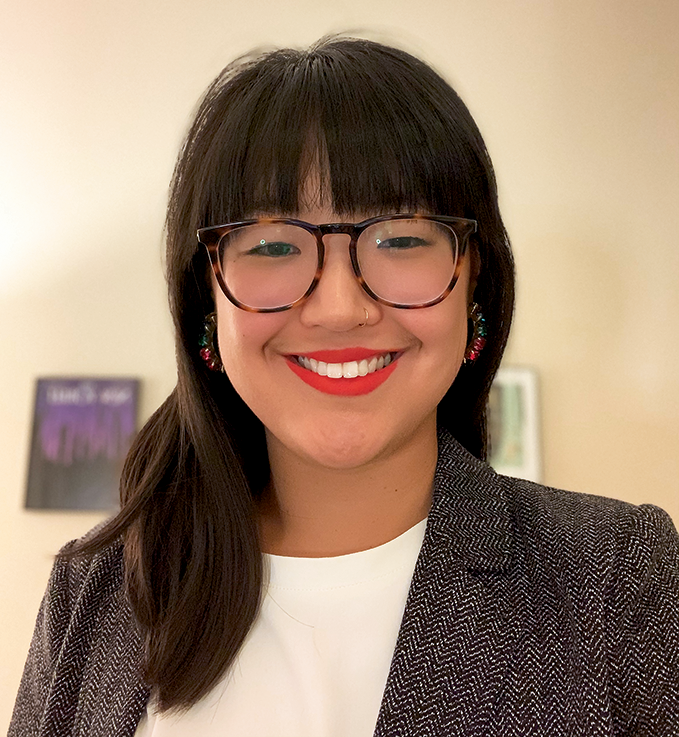To submit a question for the next featured agent, e-mail agentadvice@pw.org or write to Editor, Poets & Writers Magazine, 90 Broad Street, Suite 2100, New York, NY 10004. Questions accepted for publication may be edited for clarity and length.
Areas of interest: Upmarket/literary fiction; book club fiction; narrative nonfiction in the social sciences space (specifically history and science); across the board, a strong focus on BIPOC voices, particularly those from the AAPI community
Representative clients: Diana Biller, Shannon Dingle, June Hur, Nancy Jooyoun Kim
Looking for: Fiction—query letter and twenty-five sample pages in the body of the e-mail; nonfiction—query letter in the body of the e-mail and proposal as a Microsoft Word attachment
Preferred contact: E-mail abishop@dystel.com
Agency contact:
Dystel, Goderich & Bourret
1 Union Square West, Suite 904
New York, NY 10003
www.dystel.com
I am a college student trying to find direction. I would like to become an agent or work for an agency, but I am having trouble finding information on how to go about doing that.
Caneel from Colville, Washington
There are a couple of routes. The first is usually internships—bookjobs.com and the Publishers Marketplace job board are both great places to search. Alternatively, you can do a general Google search (“literary agency internships”) and see what comes up. (As someone who ran an internship program herself, I highly suggest you e-mail any questions you have versus cold calling.) The second can be publishing courses—the best known are the Columbia Publishing Course, the NYU Summer Publishing Institute, and the Denver Publishing Institute. These programs give you a crash course in the different facets of publishing…and probably more important they give you a network of connections to draw from. Of course you’ll be paying for the course, so this isn’t an option for everyone, unfortunately. Truthfully I don’t think your degree really matters. Many agents are English majors, but if you can write well, analyze work, have a keen editorial eye, and you are detail-oriented and conscientious, you will learn the other skills on the job. After the internship (or internships), you’d be looking for agency assistant jobs.
What is the best way to approach an agent as a self-published author?
Mitch from Louisville, Kentucky
I’ve seen the self-publishing question come up a bunch of times, so I want to address it here. To answer your question specifically, the best way to approach an agent as a self-published author is to come to them with a new work that has not been self-published. Most agencies are not going to agree to represent a previously self-published book unless the sales are fantastic (think hundreds of thousands of copies sold). The reasoning here is that the publishers who we would be trying to sell this to likely won’t be interested otherwise—they’re looking at numbers. The fact that the previously published book has already been in the market and not sold at high levels tells them it has already been tested and not worked at levels that would be beneficial to them. If you’re approaching an agent with a new work and have a self-publishing history, that’s totally fine. If you’re approaching an agent with a previously self-published work that you want to sell to a traditional house, that’s going to be more of an uphill battle.
My goal is to publish work in multiple genres. I write both YA contemporary and adult fantasy. Do I need to find an agent who specializes in both markets?
Karissa from Wichita, Kansas
Yes, you should be gearing your search toward an agent who is more of a generalist—i.e., one who is comfortable working in a variety of markets. I don’t think they have to be a specialist in every space, but they should have contacts in the spaces you want to work in and know the market well enough to sell your work there. Otherwise, you’re likely to wind up in a bit of a bind if they’re enthusiastic about your YA contemporary work but not doing adult fantasy, for example. It’s definitely worth discussing in your offer-of-representation call.
When asked for the first chapters or first three chapters, should the title page, table of contents, dedications, and foreword be included?
Dave from Mission Viejo, California
Easy answer here: no need. For a novel, we want to see your writing and the story; the front matter in a sample is just taking up useful space that you could be using to wow us with your pages!
If you are younger than eighteen, say sixteen, and have a passion for writing books and want to get your work out there, would an agent take you on or would you need to be a bit older for them to consider you?
Courtney from Ellensburg, Washington
I personally don’t think age factors in—if you’re a good writer with a fresh premise, and compelling story, why should it matter? Typically we see authors who are a little older only because they’ve had more time to develop and hone their craft, but being younger and talented certainly would not discount you from representation.









